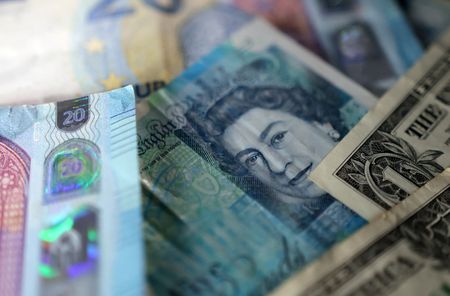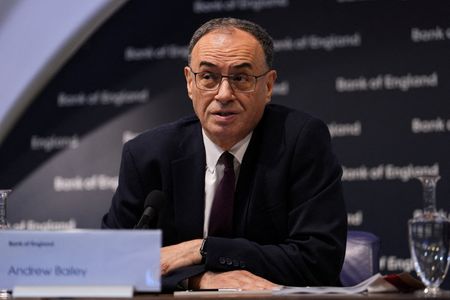By Amanda Cooper
LONDON (Reuters) -The pound rose against the dollar on Wednesday, as the U.S. currency came under broad pressure after the government in Washington DC shut down over funding to add to investor caution around U.S. assets.
The shutdown carries the risk of delaying key economic reports that filter into the Federal Reserve’s decisions to adjust monetary policy.
The central bank meets later this month and, should the shutdown persist, could find itself without meaningful official data. With that in mind, investors will use private sector measures for guidance, such as the ADP monthly employment report later on Wednesday.
Sterling wrapped up September with a 0.4% loss against the dollar, but is still up 7.7% this year, putting it on course for its strongest showing against the U.S. currency since 2017’s 9.5% rally. Against the euro, it has struggled, as the single European currency gained 0.8% last month, bringing the increase for 2025 to 5.6%.
LOOKING PAST THE DATA
UK data this week has shown the economy virtually stagnated in the second quarter of this year, while the current account deficit blew past expectations in that time to its widest since the start of the year.
“Investors appeared willing to look past these figures, given the overriding U.S. narrative. We, however, remain cautious,” analysts at Monex said.
“Sterling rallies are likely to be capped by domestic headwinds and a Bank of England that we think should be inching toward further easing, especially after the November budget has been delivered.”
The pound was last up 0.2% on the day at $1.3475, while weakening against the euro, which rose 0.12% to 87.365 pence.
British house prices rose slightly faster than expected last month, increasing 0.5% in September after a 0.1% drop in August, major mortgage lender Nationwide Building Society said on Wednesday.
According to Nationwide data, Britain’s house-price-to-earnings ratio, a key metric of home affordability, is at 5.8, around its worst in a decade.
Real wage growth, meanwhile, has slowed to a rate of 1%, from 3.4% a year ago, as inflation has remained sticky, while workers’ earnings have increased more modestly.
British consumers are struggling with persistent inflation, a high tax burden that could potentially increase with finance minister Rachel Reeves’ budget next month, and a weakening labour market.
(Reporting by Amanda Cooper; Editing by Ed Osmond)










